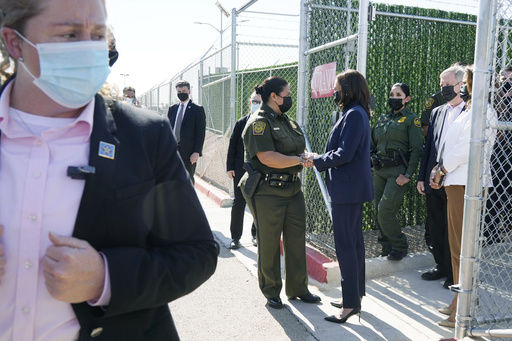In early 2021, President Joe Biden assigned Vice President Kamala Harris to handle the surge of immigrants heading towards the U.S. border, particularly from El Salvador, Guatemala, and Honduras. Harris aimed to address the root causes of migration by encouraging investments from multinational corporations and Latin American businesses in these regions to create job opportunities and discourage people from making the dangerous journey northward.
Despite a gradual decline in migration from these three Central American countries, experts believe that various other factors contributed to this decrease rather than Harris’ strategies. Republicans have criticized Harris for the challenges faced at the southern border during the administration’s tenure, holding her accountable for the issues.
Contrary to the notion that Harris was dubbed the “border czar,” she did not have an official role specifically focused on border matters. Her task involved collaborating with Central American nations to improve border enforcement and facilitate the return of migrants. Harris concentrated on long-term investments and economic development in the region rather than immediate border control measures.
Harris embarked on trips to Mexico and Central America in 2021 and 2022, advocating against migration from these regions. Her focus on fostering business investments in the Northern Triangle nations—El Salvador, Guatemala, and Honduras—resulted in pledges of over $5.2 billion from various companies.
Through Harris’ outreach efforts, companies like Visa and Nestle committed to investing in projects within these countries, with some already reporting progress towards their investment goals. Despite criticisms from Republican Senator Rick Scott questioning the impact of White House efforts on business investments, supporters credit Harris with leveraging her influence to attract investments in the risky environment of these nations.
While statistics show a substantial decrease in migration from the Northern Triangle countries since 2021, the exact impact of Harris’ approach remains debated. Some attribute the reduction to broader regional factors, such as the new president of El Salvador implementing measures to combat violent crime, leading to a significant drop in homicides.
Analysts caution that the long-term effects of investments on migration patterns may take several years to materialize or, in some cases, may not deter migration as anticipated. Despite differing viewpoints on the effectiveness of Harris’ strategies, her efforts to address the root causes of migration by promoting economic development in Central America have sparked discussions on the complex nature of immigration policies and their outcomes.
